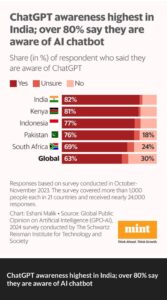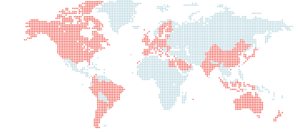THE SURVEY
According to the latest survey conducted by The Schwartz Reisman Institute for Technology and Society (SRI) on The Global Public Opinion on Artificial Intelligence survey (GPO-AI), the awareness of ChatGPT is highest in India, with over 80% of respondents indicating their awareness of Artificial Intelligence (“AI”) chatbots.

The GPO-AI survey findings, with implications for global AI policy-making, address the following:
- Concerns about AI safety, regulation, autonomous vehicles, and the effect on jobs now and in future.
- Interest and trust in AI applications for daily decision-making about clothing, travel, grocery shopping, dating, personal relationships, or finance.
- Attitudes toward the use of emerging technologies for education, justice, healthcare, and immigration activities.
- Knowledge of and personal experience with ChatGPT and deepfakes.
KEY FINDINGS
- Knowledge of AI: Globally, most people feel they understand what AI is (73%). However, knowledge varies between applications. Respondents were largely unaware of deepfakes, with only 30% citing prior knowledge of this technology.
- Attitudes: Globally, people feel positive towards AI. China, India, Indonesia, and Kenya display particularly positive feelings toward AI. 50% of global respondents support the development of AI—but there is wide variation among countries. Countries including France, the U.S., Canada, and the U.K. display the most negative views.
- AI Regulation: Respondents are divided on who should regulate AI. Technology companies are trusted to regulate AI and are the preferred actor for doing so. However, when asked directly if they trust tech companies to self-regulate, respondents are more hesitant: only 21% say yes.
- ChatGPT: Global awareness of ChatGPT is fairly high (63%). Usage levels are slightly lower in all countries (global avg. of 40%). Among ChatGPT users, frequency is relatively high: 53% use it daily or weekly. Respondents report using ChatGPT most for their job (33%) and education (28%). A significant portion of respondents (22%) also use it as an alternative to Google.
ARTIFICIAL INTELLIGENCE AND LAW
With this increasing awareness, countries worldwide are designing and implementing AI policies, legislations and best practices for the ethical use of AI. These efforts include the development of:
- Comprehensive Legislation
- Use case focused Legislation
- National AI Policy and Strategy
- Guidelines and Standards
- Task Force and constitution of committees.
European Union- On March 13, 2024, the European Parliament made a major decision to approve a new set of rules called the EU Artificial Intelligence Act, or AI Act for short. The EU introduced the first AI Law in the world.
United States- As per the latest report by the National Conference of States Legislatures on Artificial Intelligence 2024 Legislation, in the 2024 legislative session, at least 40 US states, Puerto Rico, the Virgin Islands and Washington D.C., introduced AI bills, and six states, Puerto Rico and the Virgin Islands adopted resolutions or enacted legislation. Examples of those actions include:
- Colorado required developers and deployers of high-risk AI systems to use reasonable care to avoid algorithmic discrimination and mandated disclosures to consumers.
- Florida provided grants to school districts to implement AI in support of students and teachers.
- Indiana created an AI task force.
- Maryland adopted policies and procedures concerning the development, procurement, deployment, use, and assessment of AI-enabled systems by state government units.
- South Dakota clarified that a person is guilty of possessing child pornography if the person knowingly possesses any visual depiction of a minor engaging in a prohibited sexual act, or in a simulation of a prohibited sexual act, or any computer-generated child pornography. A violation of the revised law is a Class 4 felony.
- Tennessee required the governing boards of public institutions of higher education to promulgate rules and local education boards and public charter schools to adopt policies regarding the use of AI by students, teachers, faculty, and staff for instructional purposes.
- Utah created the Artificial Intelligence Policy Act.
- The Virgin Islands established a real-time, centralised crime data system within the territorial police department.
- Washington appropriated funds for the city of Seattle to lease space for nonprofit and academic institutions to incubate technology business startups, especially those focusing on AI and develop and teach curricula to skill up workers to use AI as a business resource.
- West Virginia created a select committee on AI.
India- A proposed Digital India Act shall regulate high-risk AI systems. The Indian government has advocated for a robust, citizen-centric and inclusive “AI for all” environment. In its continuous efforts, the Government of India has taken numerous steps. As of date, below are a few of the established laws and policies that directly or indirectly include AI-
Acts and Policies-
- Information Technology Act [IN FORCE]
- The Information Technology Rules [IN FORCE]
- Competition Act [IN FORCE]
- Digital Personal Data Protection Act [IN FORCE]
- Copyright Act [IN FORCE]
- National e-Governance Plan [IN FORCE]
- Digital India Act [Proposed]
- National Strategy for AI
The relevant authorities–
- NITI Aayog
- Ministry of Electronics and Information Technology
- Ministry of Commerce and Industry
- AI Task Force
Other Initiatives-
- India is a party to the OECD’s AI principles.
- India participated in the 2023 U.K. AI Summit, which led to the Bletchley Declaration.
- India also adopted UNESCO’s Recommendation on the Ethics of AI.
- NITI Aayog, the government’s public policy think tank, launched the AI Research, Analytics and Knowledge Assimilation platform to elaborate on AI requirements in India.
- India AI, an umbrella program of the Ministry of Electronics and Information Technology.
OTHER JURISDICTIONS
Other jurisdictions actively working on the development of robust AI legislation include Argentina, Australia, Bangladesh, Brazil, Canada, Chile, China, Colombia, Egypt, Indonesia, Israel, Japan, Mauritius, New Zealand, Peru, Saudi Arabia, Singapore, South Korea, Taiwan, United Arab Emirates, and the U.K.

With high awareness of AI technologies like ChatGPT in India and positive global sentiments towards AI, the survey underscores the critical need for comprehensive and ethical AI policies across nations. Global efforts, from regulatory frameworks in the European Union to diverse legislative actions in the United States and ongoing initiatives in India, are pivotal in shaping a responsible and inclusive AI landscape.
AI startups in India should prioritize integrating ethical practices into their daily operations to align with existing and proposed legislation. By fostering awareness and understanding of regulatory frameworks such as the Digital India Act and other relevant policies, startups can ensure compliance and build trust among stakeholders. Emphasizing transparency, accountability, and responsible AI deployment will not only mitigate risks but also foster innovation in a manner that is ethically sound and legally compliant. As pioneers in the AI sector, startups play a crucial role in setting standards that uphold both technological advancement and societal well-being, paving the way for a sustainable and progressive AI ecosystem in India.
We hope that this piece of information from Businezexcellence Team will inspire Indian AI Startups to lead with ethical practices and achieve full legal compliance.
Happy Reading!
Team Businezexcellence


